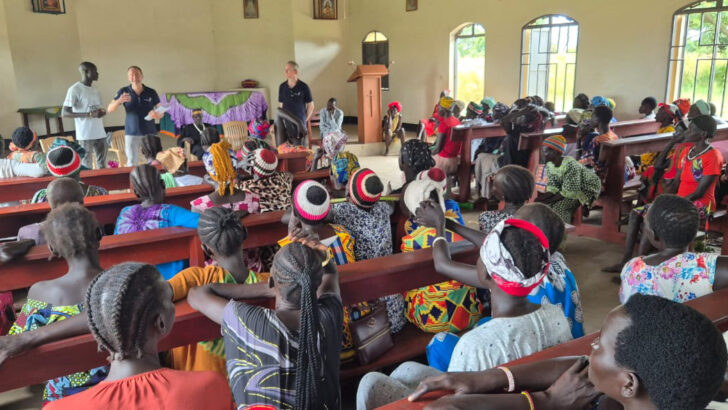Sometimes you just need a little reminder that decency is still out there. Some example of men and women coming together, applying their gifts and talents for the good of humanity. Thankfully, we’re still in a period of time where a mere glance into some of the endeavours of those working for justice and equality in the Church will yield an abundance of these remarkable examples.
Misean Cara, an Irish membership organisation supporting the overseas development projects of missionaries who work with poor, marginalised and vulnerable communities in some of the poorest countries in the world, is quite possibly the greatest example of the decency that continues to permeate the Church.
Two of Misean Cara’s staff team, Dario Devale and Seamus O’Leary travelled to the nascent state of South Sudan in October, a country fraught with challenges, to witness some of Misean Cara’s members’ humanitarian efforts in action.
South Sudan, as Dario points out, is a priority area of intervention and the support from Misean Cara is crucial due to the vast challenges it’s facing as the world’s youngest country, coupled with the conflict that has emerged and sustained since the foundation of the state.
Support
“The support is going on for several years now,” Dario said. “South Sudan is one of the priority areas of intervention and support from Misean Cara. Not only financially but also in the support of our members there; their approach, their interventions.
“It’s actually the youngest country in the world and became an independent state in 2011. There was lots of hope and lots of expectations towards this new chapter of South Sudan. The reality has been much more complicated. There have been conflict and tensions, among local tribes and communities – lots of inter-ethnic conflict.
“These exacerbated the situation, with dire conditions in all aspects of civil society, government, health, infrastructure, education, agriculture, etc. It’s in this context that we visited in October.”
The consequences of being the youngest country in the world are felt widely as state institutions, services and infrastructure have either not been established or are not of sufficient quality to really aid the local population. This means that basic needs often go neglected, particularly around the provision of education, and this is why Misean Cara has invested resources heavily into its members’ projects that work to improve the structures of education in the country.
“One of the two major sectors of intervention is education. The De La Salle Brothers support a secondary school with boys staying there in the boarding school. They want them to thrive in life, particularly because they’re coming from a very conflictual context.
“These students have an opportunity to have a safe place to study in a conducive environment. There are skilled and knowledgeable teachers, both South Sudanese and also coming from neighbouring countries like Uganda and Kenya.”
Education has become a tool of unity, particularly in communities where tribal allegiances stoke divisions and discord. The far-reaching value of education has been recognised by religious missionary orders supported by Misean Cara and they’ve developed an inventive strategy to forge this togetherness.
“Every year as part of the enrolment criteria, the De La Salle select 80 new students and among them 60 are from the area and 20 are from all over the country,” he said. “This is a specific choice by the De La Salle Brothers to create integration, cohesion, co-existence and to put together kids and students from different tribes and geographical areas. They’re learning a different way of living together, not in a conflictual or dehumanising way. They’re building a peaceful future more than anything.
“The school is rated the fourth best nationally in terms of final results. People are really recognising that we will have a qualified, skilled generation. They’re more qualified than any other formal primary school teachers. It really shows how successful the interventions have been.”
Dedicate
Other missionary orders dedicate their time to other areas of self-sufficiency, like farming, and each bit of progress falls into the religious orders’ long-term vision for the country.
“With the Spiritans we visited a livelihood agricultural project, focusing on women,” he said. “This project provided tools to cultivate cereals, vegetables and fruit.
“There’s creativity, solidarity and empowerment. The brothers have a long-term vision and commitment – they’re not just passing through. Little seeds for a better future; that has been my impression at least.”
Seamus O’Leary accompanied Dario on the trip, a trip that was more than fitting when taking into account how much funding Misean Cara has invested into its member organisations and services based in the country over the last 12 years.
“Since 2012, we have approved €10 million in funding for South Sudan,” he said. “That would put it in the top 10 countries where Misean Cara channels the funding.
“We put a lot of funding into Solidarity with South Sudan, which is an umbrella body of many different missionary organisations, about 40 in total are involved. The director at the moment is Fr Jim Greene who is a Missionary of Africa Father from Kilkenny.
“Solidarity with South Sudan has a focus on building up systems. A thing we like about the organisation is the way they work with the local Church structures. In many parts of the world, Church structures and institutions are the primary providers of education and health care. So trying to strengthen the Church structures around that is a key area of focus.”
Collaborating
One of the religious orders Misean Cara has been collaborating with in the country is the Loreto Sisters. Their overarching commitment concerns women’s access to education and this can be a difficult achievement given the cultural milieu and attitudes in the country.
“The Loreto Sisters have a school in Rumbek that we’ve supported for many years and have other facilities around it,” he said. “They have a really interesting initiative which involves contracting and basically before they will admit a girl to a school they sign a contract with the girl’s family and the local chief.
“So then when pressure comes on later from the wider extended family to arrange a marriage of some of the girls, the sisters have been able to use that in conjunction with the local chiefs to say that ‘hold on now. We agreed this two years ago and there are still another few years to go’. This is one of the examples of tangible results for the girls that have been enabled to stay in school.
“We’re now looking at an association of past pupils of the Loreto School who have set up an alumni and are working to try and set up schools in other areas. The government is very supportive of the
setting up of schools and hospitals by Church structures. For now the external support of the Church is welcome in the short-term.”
Although Misean Cara is at the coalface of the challenges faced and the continuous flare-ups of conflict that imperil the stability of the country, Seamus still believes that there’s cause for optimism because of the commitment of the missionaries on the ground who remain unfailing in their efforts to empower, whatever the challenge, whatever the circumstance.
“I’d like to be optimistic,” he said. “The takeaway for me was the missionaries that we met on the ground. Missionaries from Ireland and many different parts of the world. Indeed even local teaching staff as well. We met really committed individuals. These are people who build long-term relationships and who care about the people in the communities they meet in very difficult situations. They have this resilience and commitment to stay there.
“You won’t meet anyone in the missionary circle that doesn’t want to be there. They’re there because they believe they can make a change.”


 Brandon Scott
Brandon Scott